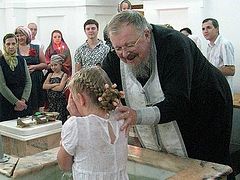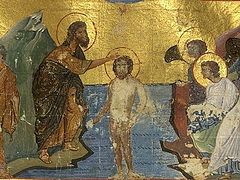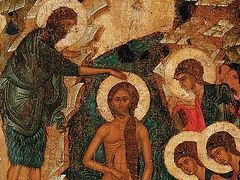Baptism is the first Church sacrament that a person who comes to believe in Christ encounters. A baptized person becomes a Church member and gets the opportunity to be in contact with God and receive His grace. But why is all of this possible only on condition of Baptism?
Why are Christians convinced that a person cannot be saved unless he is Baptized?
Christians are those who trust the Lord Jesus Christ. In stating that an unbaptized person can’t inherit the Kingdom of God, they rely on His words.
Firstly, His instruction to the disciples at the end of the Gospel of Mark: He that believeth and is baptized shall be saved; but he that believeth not shall be damned (Mk. 16:16). Secondly, in the Gospel of John the Savior explains to Nicodemus: Except a man be born of water and of the Spirit, he cannot enter into the Kingdom of God (Jn. 3:5-6). Thirdly, the Gospel of Matthew concludes with the Lord’s significant call: Go ye therefore, and teach all nations, baptizing them in the name of the Father, and of the Son, and of the Holy Ghost: teaching them to observe all things whatsoever I have commanded you (Mt. 28:19-20). Though He doesn’t speak directly about the saving nature of Baptism, the instruction to baptize people sounds as an irrevocable commandment.
From what are those who will believe and be baptized promised to be saved?
Firstly, from the bondage of sin, when that which I do I allow not: for what I would, that do I not (Rom. 7:15). Secondly, from slavery to satan, who by deceit and slander against God provoked the fall of Adam and Eve. Thirdly, from death, which conquered the world as a result of the fall.
In Orthodox Christianity, salvation is not only liberation from these three types of bondage. It is the ultimate intimacy and entry into a filial relationship with God, attaining unity with Him and gaining the Kingdom of God, where “God shall be all in all” (cf. 1 Cor. 15:28). Christ calls salvation life eternal, about which we have little to say, except that it will be unimaginably beautiful, joyful and, as Metropolitan Anthony of Sourozh put it, overflowing with abundance. Eye hath not seen, nor ear heard, neither have entered into the heart of man, the things which God hath prepared for them that love Him (1 Cor. 2:9).
How are Baptism and faith related to each other?
Baptism is the fulfilment, the practical expression of faith in Christ. It is a specific step, and he who takes it not only declares his agreement with the Gospel truths, but makes a personal covenant with Christ, enters into union with Him.
What do a man and a woman do if they love each other and want to spend their entire life together? They get married, make mutual promises of love and fidelity. A Christian’s relationship with God is reminiscent of such a marriage. Not without reason did God in the Bible liken His relationship with believers to marriage. In the Old Testament He compares the Israelites who lapsed from Him into paganism with a dissolute wife (e.g., in the Book of Hosea). The New Testament compares Christ with the Bridegroom entering into marriage with the Church.
In the service of Baptism there is a moment when the priest asks the person over whom the sacrament is being performed: “Do you unite yourself to Christ?”—just as at the wedding service. And he answers: “I unite myself”, and “I believe in Him as King and God.” A person’s faith in Christ as King and God and his confidence in Him is what is evidenced by the fact of Baptism. Originally the Gospels were written in Greek. According to Fr. Alexander Schmemann, the Greek word for “faith” (πίστις) means not so much the consent of the mind with a set of rules as trust, unconditional devotion, full surrender of oneself to the one who should be obeyed and followed.
 “Baptism” by I. Aivazovsky, 1890
“Baptism” by I. Aivazovsky, 1890
This faith as selfless devotion to Christ is imprinted by Baptism, as St. Philaret of Moscow said. It’s impossible to imagine a person who sincerely believes in Christ but for some reason avoids Baptism.
But do the words, “being born of water and the Spirit”, directly mention Baptism?
Literally—no, but in fact they are about Baptism. The Greek word for Baptism (βάπτισμα) means “immersion in water.” In His talk with Nicodemus, Christ expounds the meaning of Baptism as being born from above. Except a man be born of water and of the Spirit, he cannot enter into the Kingdom of God.
But to be born again you first need to die, don’t you?
According to St. Paul, Baptism is the experience of death and birth, in the likeness of the death and the Resurrection of the Lord. Know ye not, that so many of us as were baptized into Jesus Christ were baptized into His death Therefore we are buried with Him by Baptism into death: that like as Christ was raised up from the dead by the glory of the Father, even so we also should walk in newness of life. For if we have been planted together in the likeness of His death, we shall be also in the likeness of His Resurrection… Now if we be dead with Christ, we believe that we shall also live with Him (Rom. 6:3-5, 8).
Of course, a person doesn’t die and doesn’t bodily rise in the Baptismal font. It’s not about biological death and physical resuscitation. Nor is it about any conventional, symbolic things or artistic metaphors. Everything that happens in the sacrament happens in reality but concerns primarily the spiritual aspect of a person. He emerges from the Baptismal water spiritually reborn; he’s ready to start his spiritual life anew.
 “The Baptism of Rus’” by V. Navozov
“The Baptism of Rus’” by V. Navozov
In any sacrament a person encounters the action of God, which Christians call “grace”. In Baptism, this act of God consists in the fact that a person is freed from slavery to sinful inclinations and the “bad inheritance” received from Adam. Now he is able to resist sinful habits because he has a new relationship—no longer with the old Adam, but with the New, the God-Man. A baptized person becomes a member of the Church—the community of believers in Christ that St. Paul calls the Body of Christ. He unites with Christ, the Son of Man; since He is the Son of God at the same time, a baptized person is adopted by God the Father and becomes able to live one life with Him—the everlasting, blessed life of the Heavenly Kingdom. He’s no longer just a creation of God, but His son or daughter. Therefore, everything that the Father has belongs to him or her as well.
Reckon ye also yourselves to be dead indeed unto sin, but alive unto God through Jesus Christ our Lord (Rom. 6:11). The old man dies and the new man is born, and, in Fr. Alexander Schmemann’s words, he is endowed with the gift of living the life of Christ, believing His faith, desiring what He desires.
Nourished by the gift of grace he received in Baptism, a person is able to move towards the Kingdom of God, which in practice means to fulfil the commandments of Christ: to overcome his own egoism, to overstep the demands of his “ego” and put God and his neighbors first. A baptized person is able to live contrary to the rules that became “natural” for this world after the fall. He is able to want this life—not for himself, but for God, the life Christ offers him, the continuation of which is the Kingdom of God. An unbaptized person has no strength for this: he has nowhere to take it from.
Does this mean that a baptized person becomes a saint?
Any discussion of holiness would be long and far from easy. Holiness is an attribute of God, Who is unknowable, and so it is not easy to define what holiness is. One thing can be said with certainty: A person who is baptized is called to holiness, but he doesn’t achieve it immediately and not everybody does. Baptism doesn’t deprive a person of free will and doesn’t turn him into an angel. He is still exposed to various temptations, he can stumble and sin. But, unlike an unbaptized person, the grace-filled help of God is available to him to cope with all this. Even if he stumbles and falls, he will be able to rise, repent and continue on his way.
“He who is baptized and chrismated has in himself, as a possibility, all the Divine gifts that are revealed in him at one time or another, depending on how much he purifies himself and becomes worthy of the gifts of God acting in him,” wrote St. Simeon of Thessalonica. So Baptism is absolutely necessary, though it not the only condition for a person’s salvation from sin.
Aren’t all sins forgiven in Baptism?
True, after Baptism a person “turns over a new leaf”, all his past sins are erased and forgotten. But these sins are specific actions, words or thoughts that violate the commandments. The situation is different with passions—“distortions” of the human soul, internal predispositions to bad deeds. Outwardly, they can be imperceptible and not manifest themselves until a certain time, but they provoke a person to commit specific sins. Maybe he has never stolen anything, but he is greedy for money and in some critical situation this passion “flares up”, leading to him committing a sin. The same can be said of the other passions.
Unfortunately, passions remain with a person even after Baptism. But now with the help of God he can combat them and gradually overcome them. The Church sacraments help in this—first of all, repentance (confession) and Communion of the Body and Blood of Christ. But it becomes possible to participate in these sacraments only after one has been baptized. All the sacraments are performed only in the Church as it’s the Body of Christ and the space where God can act with the consent of people (and not against their will). It is in Baptism that we become members of the Church.
Do I have to have preparatory talk before the sacrament of Baptism? Today, mostly babies are baptized and they can’t take part in such a conversation.
It depends. If parents who want to get their child baptized go to church regularly, take Communion and live an active Church life, the priest may not insist on them attending catechetical talks. But in most cases priests, deacons, and laymen involved in catechization work are expected to prepare people for Baptism by talking with those who want to get baptized or with their parents or godparents if they are children. This is necessary because Baptism is not a self-sufficient act that you’ve performed and that’s the end. It’s only the beginning of the path following which a person transforms his life in accordance with the Gospel and only then begins to truly seek the Kingdom of Heaven and a meeting with God. People often imagine Baptism as anything, but not one of these categories. If you don’t tell them what Baptism really is, what it is for, they won’t start moving along this road and won’t reach their goal. In the early Church the process of catechism could take forty days (and sometimes more).
 “The Preaching of St. John the Baptist” By P. Bruegel the Elder
“The Preaching of St. John the Baptist” By P. Bruegel the Elder
True, small children can’t consciously participate in catechetical talks. Yet they aren’t baptized by their own faith, but by the faith of their parents and godparents. Adults take responsibility for ensuring that when the child grows up, he learns about the meaning of Baptism and integrates into Church life in the same way that they take the responsibility for him in everything else.
What about an unbaptized person? He can’t inherit the Kingdom of God under any circumstances?
How much I sometimes would like to say that an unbaptized person can be saved if he believes in God and makes efforts to improve! But Christ said clearly: Except a man be born of water and of the Spirit, he cannot enter into the Kingdom of God. It’s hard to interpret these words in a different way.
In the early Church, however, there was the concept of Baptism in blood: martyrs who came to believe in Christ just before their deaths and didn’t manage to get baptized were not only considered Christians they were even canonized. One of such martyrs was a Roman soldier who guarded the Martyrs of Sebaste. Seeing the fortitude and courage of the Christians, stripped and driven into an icy lake, he came to believe in Christ, joined them and was later glorified as a martyr. But the martyrs, even if they didn’t manage to get baptized, suffered for a reason—they consciously participated in the Passion of Christ, walked to their Golgotha following His example.
Not any suffering can be equated with Baptism, but only that which a person consciously devotes to Christ, experiences as his personal participation in His sacrifice on the Cross. This kind of suffering is called, “suffering for Christ’s sake.”
But Baptism in itself is not at all a way to avoid suffering. It’s the dedication of your whole life and everything in it, to Christ. It’s participation in His life and death, voluntary entry into them. If this is not the case, if in suffering a person doesn’t put his shoulder beneath the Cross of Christ, he suffers in vain as a meaningless victim of evil, in which the whole world lies since the fall. He can’t even be called an innocent victim because everyone has done something that deserves punishment.
 “Christ and the Sinner” by A. Mironov
“Christ and the Sinner” by A. Mironov
Suffering can sober a person up and bring him to the Church. But suffering in itself cannot replace Baptism.
What if a person lived righteously and fulfilled the commandments by his deeds, perhaps without knowing that they were Christian?
The Church doesn’t pass judgment on such people, leaving them to the judgment of God. The Parable of the Last Judgment leaves the hope of salvation for those who didn’t know Christ but by deeds fulfilled His commandments: They fed the hungry, visited the sick, dressed the poor, giving themselves to their neighbors. At the Last Judgment they will ask Christ: Lord, when saw we Thee an hungred, and fed Thee? or thirsty, and gave Thee drink? When saw we Thee a stranger, and took Thee in? or naked, and clothed Thee? Or when saw we Thee sick, or in prison, and came unto Thee? And the King shall answer and say unto them…, Inasmuch as ye have done it unto one of the least of these My brethren, ye have done it unto Me (Mt. 25:37-40). This doesn’t guarantee that these people will be saved outside the Church. Christ is the Head of the Church and He can lead into His Church any person in a way known to Him alone.
Righteous people of the Old Testament (Noah, Abraham, Moses, David) weren’t baptized, but nevertheless the Church honors them among the saints. But people living in the Christian era, when the Gospel is available to anyone, are more answerable for this. So there is hardly any point in spending a lot of time speculating about the fate of unbaptized people as if there were absolute clarity concerning our own fate. Let’s repeat once again: the fact of Baptism alone doesn’t make a person an angel-like creature; he will have to struggle against sin for a long time and painfully fall and rise again, building his life in accordance with the Gospel. So St. Paul’s advice is relevant to us: Every one of us shall give account of himself to God. Let us not therefore judge one another any more: but judge this rather, that no man put a stumblingblock or an occasion to fall in his brother’s way (Rom. 14:12-13).





